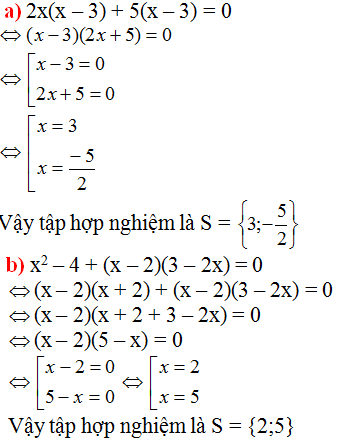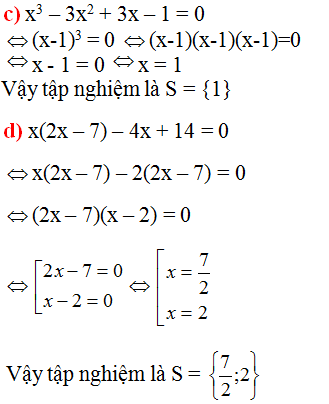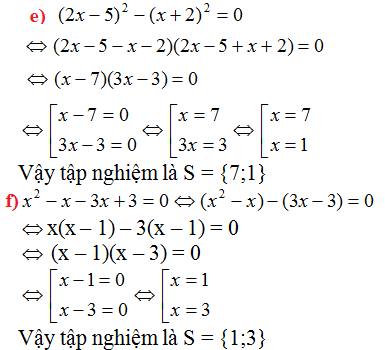Hãy nhập câu hỏi của bạn vào đây, nếu là tài khoản VIP, bạn sẽ được ưu tiên trả lời.

\(a,2x\left(x-3\right)+5\left(x-3\right)=0\)
\(\Leftrightarrow\left(2x+5\right)\left(x-3\right)=0\)
\(\Leftrightarrow\orbr{\begin{cases}2x+5=0\\x-3=0\end{cases}}\Leftrightarrow\orbr{\begin{cases}2x=-5\\x=3\end{cases}}\Leftrightarrow\orbr{\begin{cases}x=-\frac{5}{2}\\x=3\end{cases}}\)
Vậy .........
\(b,\left(x^2-4\right)+\left(x-2\right)\left(3-2x=0\right)\)
\(\Leftrightarrow x^2-4-2x^2+7x-6=0\)
\(\Leftrightarrow-x^2+7x-10=0\)
\(\Leftrightarrow-\left(x-5\right)\left(x-2\right)=0\)
\(\Leftrightarrow\orbr{\begin{cases}x=5\\x=2\end{cases}}\)
Vậy ..................
\(c,x^3-3x^2+3x-1=0\)
\(\Leftrightarrow\left(x-1\right)^3=0\)
\(\Leftrightarrow x=1\)
\(d,x\left(2x-7\right)-4x+14=0\)
\(\Leftrightarrow2x^2-7x-4x+14=0\)
\(\Leftrightarrow2x^2-11x+14=0\)
\(\Leftrightarrow\left(2x-7\right)\left(x-2\right)=0\)
\(\Leftrightarrow\orbr{\begin{cases}x=\frac{7}{2}\\x=2\end{cases}}\)
Vậy ............
\(e,\left(2x-5\right)^2-\left(x+2\right)^2=0\)
\(\Leftrightarrow4x^2-20x+25-x^2-4x-4=0\)
\(\Leftrightarrow3x^2-24x+21=0\)
\(\Leftrightarrow3\left(x-7\right)\left(x-1\right)=0\)
\(\Leftrightarrow\orbr{\begin{cases}x-7=0\\x-1=0\end{cases}}\Leftrightarrow\orbr{\begin{cases}x=7\\x=1\end{cases}}\)
Vậy .....................
\(f,x^2-x-\left(3x-3\right)=0\)
\(\Leftrightarrow x^2-x-3x+3=0\)
\(\Leftrightarrow x^2-4x+3=0\)
\(\Leftrightarrow\left(x-3\right)\left(x-1\right)=0\)
\(\Leftrightarrow\orbr{\begin{cases}x-3=0\\x-1=0\end{cases}}\Leftrightarrow\orbr{\begin{cases}x=3\\x=1\end{cases}}\)
Vậy ..............

1. \(x^2\left(x+1\right)+x+1=0\)
\(\Leftrightarrow\left(x+1\right)\left(x^2+1\right)=0\)
\(\Leftrightarrow x+1=0\Rightarrow x=-1\)
2. \(\left(x-2\right)\left(6x+2\right)+\left(x-2\right)^2=0\)
\(\Leftrightarrow\left(x-2\right)\left(6x+2+x-2\right)=0\)
\(\Leftrightarrow\left(x-2\right).7x=0\)
\(\Leftrightarrow\left[{}\begin{matrix}x-2=0\\7x=0\end{matrix}\right.\) \(\Rightarrow\left[{}\begin{matrix}x=2\\x=0\end{matrix}\right.\)
3.
\(x^2-5x+6=0\)
\(\Leftrightarrow x^2-2x-3x+6=0\)
\(\Leftrightarrow x\left(x-2\right)-3\left(x-2\right)=0\)
\(\Leftrightarrow\left(x-3\right)\left(x-2\right)=0\Rightarrow\left[{}\begin{matrix}x=2\\x=3\end{matrix}\right.\)
4.
\(x^2-x-6=0\)
\(\Leftrightarrow x^2+2x-3x-6=0\)
\(\Leftrightarrow x\left(x+2\right)-3\left(x+2\right)=0\)
\(\Leftrightarrow\left(x-3\right)\left(x+2\right)=0\Rightarrow\left[{}\begin{matrix}x=3\\x=-2\end{matrix}\right.\)

a) \(\left(x+1\right)\left(2x-1\right)\left(-x+2\right)=0\)
\(\Leftrightarrow\left[\begin{matrix}x+1=0\\2x-1=0\\-x+2=0\end{matrix}\right.\Leftrightarrow\left[\begin{matrix}x=-1\\x=\frac{1}{2}\\x=2\end{matrix}\right.\)
Vậy phương trình có tập nghiệm là \(S=\left\{-1;\frac{1}{2};2\right\}\)
b) \(\left(2x-1\right)\left(3x+2\right)\left(4x-5\right)\left(x-7\right)=0\)
\(\Leftrightarrow\left[\begin{matrix}2x-1=0\\3x+2=0\\4x-5=0\\x-7=0\end{matrix}\right.\Leftrightarrow\left[\begin{matrix}x=\frac{1}{2}\\x=-\frac{2}{3}\\x=\frac{5}{4}\\x=7\end{matrix}\right.\)
Vậy phương trình có tập nghiệm là \(S=\left\{\frac{1}{2};-\frac{2}{3};\frac{5}{4};7\right\}\)
c) \(x^2-6x+11=0\)
\(\Leftrightarrow x^2-6x+9+2=0\)
\(\Leftrightarrow\left(x-3\right)^2+2=0\) (vô lí)
Vậy phương trình vô nghiệm
d) \(\left(x^2+2x+3\right)\left(x^2-25\right)\left(x+19\right)=0\)
\(\Leftrightarrow\left(x^2+2x+1+2\right)\left(x+5\right)\left(x-5\right)\left(x+19\right)=0\)
\(\Leftrightarrow\left[\left(x+1\right)^2+2\right]\left(x+5\right)\left(x-5\right)\left(x+19\right)=0\)
\(\Leftrightarrow\left[\begin{matrix}x+5=0\\x-5=0\\x+19=0\end{matrix}\right.\Leftrightarrow\left[\begin{matrix}x=-5\\x=5\\x=-19\end{matrix}\right.\)
Vậy phương trình có tập nghiệm là \(S=\left\{\pm5;-19\right\}\)
a,b,d dễ mà bạn tự làm
c,x2-6x+11=0<=> x2-6x+9+2=0
<=>(x-3)2=-2(vô lý)
vậy pt vô nghiệm

a ) \(\left(5x+7\right)\left(x-7\right)=0\)
\(\Leftrightarrow\left[{}\begin{matrix}x=-\dfrac{7}{5}\\x=7\end{matrix}\right.\)
b ) \(\left(x^2-1\right)\left(x+3\right)=0\)
\(\Leftrightarrow\left(x-1\right)\left(x+1\right)\left(x+3\right)=0\)
\(\Leftrightarrow\left[{}\begin{matrix}x=1\\x=-1\\x=-3\end{matrix}\right.\)
c )\(x^2-x-6=0\)
\(\Leftrightarrow x^2-3x+2x-6=0\)
\(\Leftrightarrow\left(x+2\right)\left(x-3\right)=0\)
\(\Leftrightarrow\left[{}\begin{matrix}x=-2\\x=3\end{matrix}\right.\)
d ) \(x^2+x-12=0\)
\(\Leftrightarrow x^2-4x+3x-12\)
\(\Leftrightarrow\left(x+3\right)\left(x-4\right)=0\)
\(\Leftrightarrow\left[{}\begin{matrix}x=-3\\x=4\end{matrix}\right.\)
e ) \(15\left(x+9\right)\left(x-3\right)\left(x+21\right)=0\)
\(\Leftrightarrow\left[{}\begin{matrix}x=-9\\x=3\\x=-21\end{matrix}\right.\)
g ) \(\left(x^2+1\right)\left(x^2+4x+4\right)=0\)
\(\Leftrightarrow\left(x^2+1\right)\left(x+2\right)^2=0\)
\(\Leftrightarrow\left[{}\begin{matrix}x^2=-1\left(loại\right)\\x=-2\end{matrix}\right.\)
i ) \(x^4+2x^3-2x^2+2x-3=0\)
\(\Leftrightarrow x^4+3x^3-x^3-3x^2+x^2+3x-x-3=0\)
\(\Leftrightarrow x^3\left(x+3\right)-x^2\left(x+3\right)+x\left(x+3\right)-\left(x+3\right)=0\)
\(\Leftrightarrow\left(x^3-x^2+x-1\right)\left(x+3\right)=0\)
\(\Leftrightarrow\left(x^2+1\right)\left(x-1\right)\left(x+3\right)=0\)
\(\Leftrightarrow\left[{}\begin{matrix}x^2=-1\left(loại\right)\\x=1\\x=-3\end{matrix}\right.\)
h) \(x^2+5x+6=0\)
\(\Leftrightarrow x^2+3x+2x+6=0\)
\(\Leftrightarrow\left(x+2\right)\left(x+3\right)=0\)
\(\Leftrightarrow\left[{}\begin{matrix}x=-2\\x=-3\end{matrix}\right.\)

a) Đúng
b)Đúng
c)Sai vì nghiệm không thỏa mãn ĐKXĐ
d)Sai vì có 1 nghiệm không thỏa mãn ĐKXĐ

\(\left(x-2\right)^2+\left|x-5\right|-x^2-14=0.\)
\(\left(x^2-4x+4\right)+\left|x-5\right|-x^2-14=0.\)
\(x\text{}\text{}\text{}^2-4x+4+\left|x-5\right|-x^2-14=0.\)
\(x\text{}\text{}\text{}^2-x^2-4x+4-14+\left|x-5\right|=0.\)
\(-4x-10+\left|x-5\right|=0\)
.. đến đây xét tiếp để ra kq ạ -,-

b: =>(2x-1)(2x-1+4-2x)=0
=>3(2x-1)=0
=>2x-1=0
=>x=1/2
c: =>(x+1)(x^2-x+1)-x(x+1)=0
=>(x+1)(x-1)^2=0
=>x=1 hoặc x=-1
e: =>(2x-1)(2x+1)=0
=>x=1/2 hoặc x=-1/2
h: =>x[(x^2-5)^2-4]=0
=>x(x^2-7)(x^2-3)=0
=>\(x\in\left\{0;\pm\sqrt{7};\pm\sqrt{3}\right\}\)
k: =>(x-1)(5x+3-3x+8)=0
=>(x-1)(2x+11)=0
=>x=1 hoặc x=-11/2
l: =>x^2(x+1)+(x+1)=0
=>(x+1)(x^2+1)=0
=>x+1=0
=>x=-1



Mỗi câu mình sẽ chia làm 2 phần( VT là ( 1 ) ,VP là ( 2 ) nha bạn !!!
a)
(1) (x -1)2 + 2 = (x-2)2
<=> x2 -2x + 1 + 2 =x2 - 4x + 4
<=> 2x = 1
<=> x = 1/2
(2) 2x3 -x2 + 2x - 1 = 0
<=> ( x - \(\frac{1}{2}\)) = 0
<=>x = 1/2
Vậy 2 PT trên tương đương
d)
(1) x + 1 = x là phương trình vô số no
(2) x3 + 1 = 0 là PT vô no
=> 2 pt trên không tương đương
c) và b) thì ...